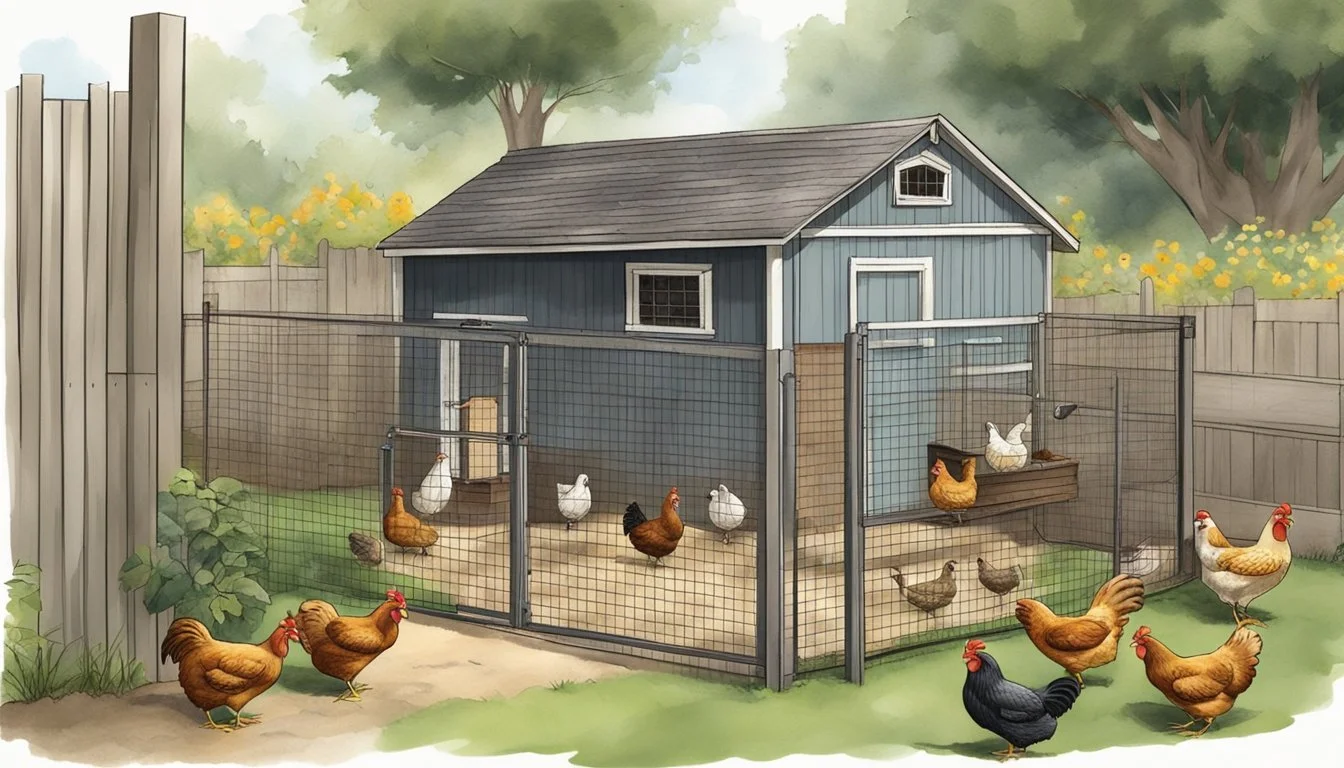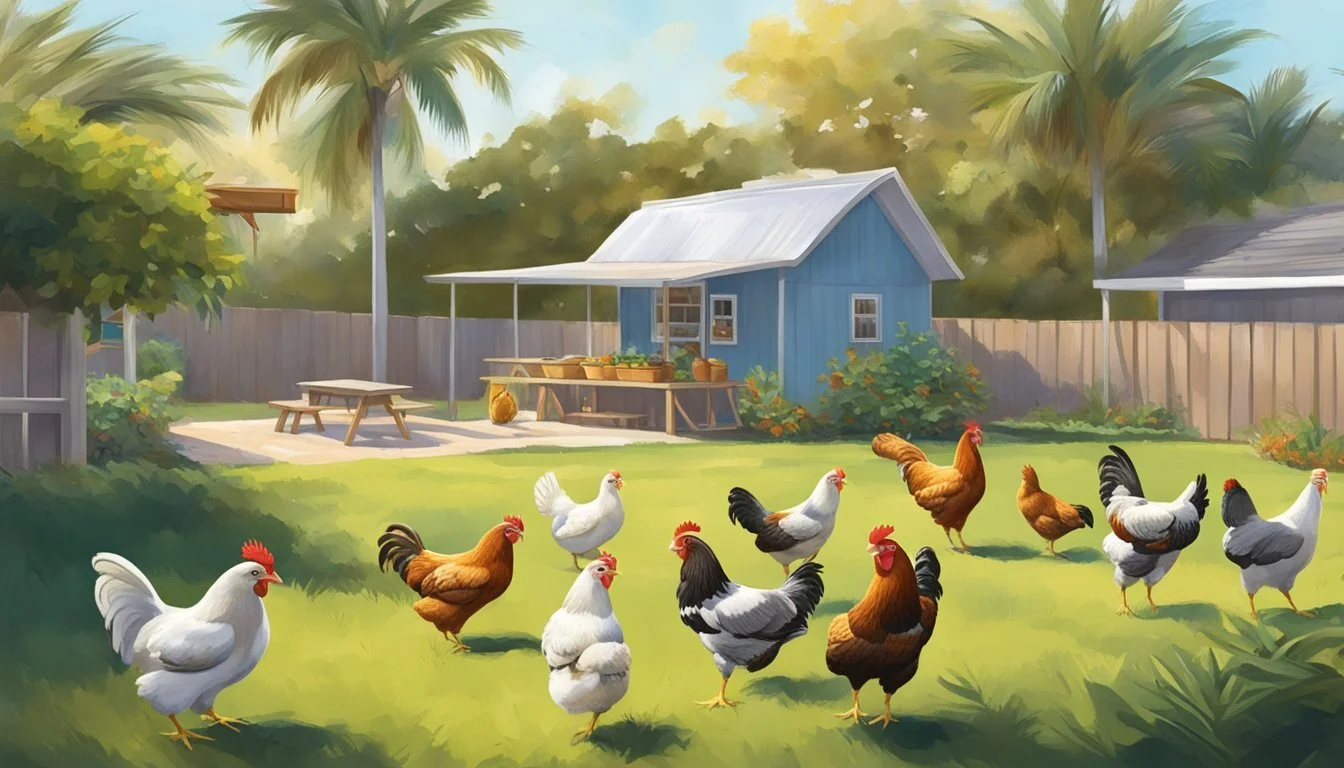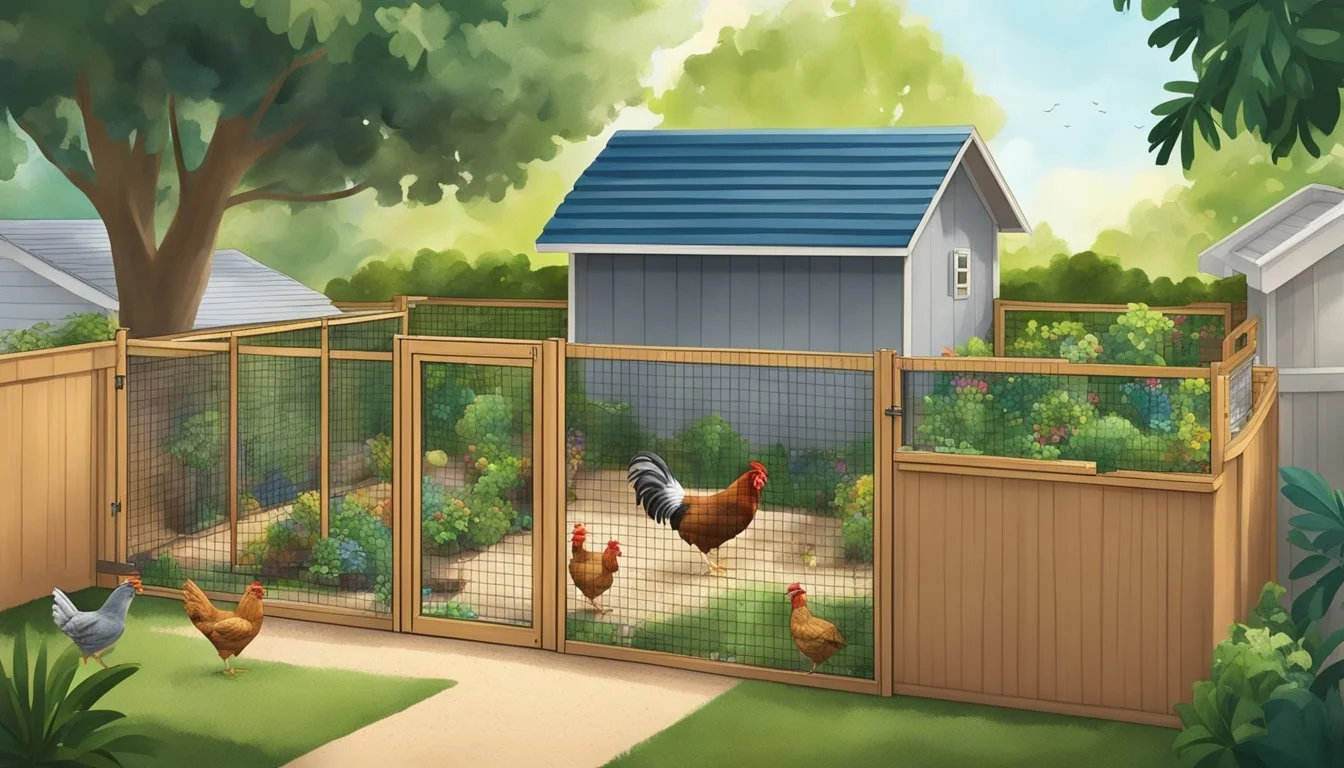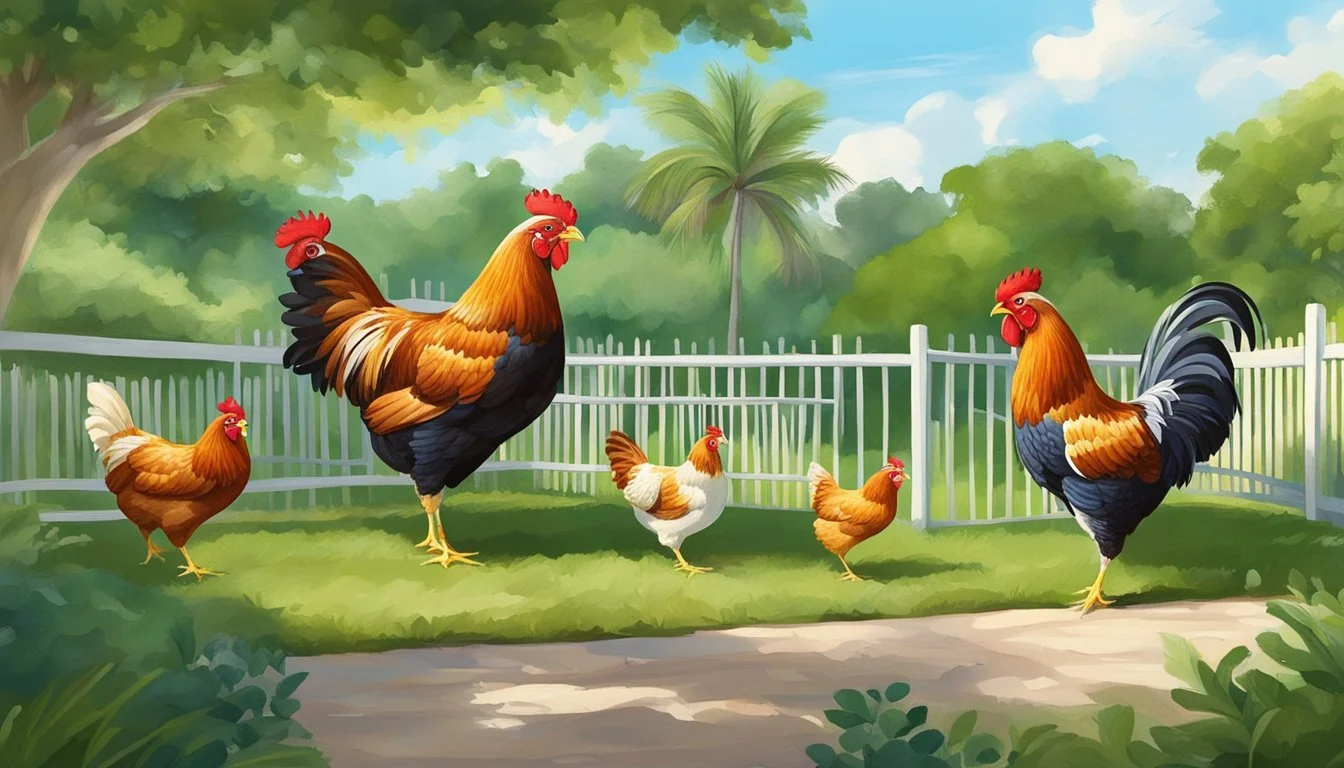Keeping Backyard Chickens in Pompano Beach, FL
Essential Guidelines for Urban Poultry Farming
In Pompano Beach, Florida, the interest in maintaining backyard chickens has grown, aligning with a nationwide increase in urban agriculture. However, residents must adhere to specific ordinances that are in place to ensure the health and safety of the community. Within the city limits of Pompano Beach, the keeping of livestock, which includes chickens, is controlled under municipal code § 90.24. This ordinance prohibits the harboring, keeping, or maintenance of livestock, including chickens, without proper authorization, emphasizing the city's effort to maintain order and public health.
Understanding the local regulations is crucial for any Pompano Beach resident considering starting their own backyard flock. Each potential chicken keeper needs to be aware that non-compliance with the strict guidelines set forth can result in violations. There is an exception that allows the keeping of horses in certain city-owned and operated facilities, but for chickens, the regulations are more stringent due to their typical role as backyard animals. The city's approach exemplifies the balance between allowing personal freedom and maintaining community standards.
Legal Requirements
When considering keeping backyard chickens in Pompano Beach, FL, residents must adhere to the city's legal framework. Understanding the specific zoning laws, obtaining necessary permits, and ensuring compliance are critical steps in the process.
Understanding Local Zoning Laws
Zoning regulations determine where and how many chickens can be kept. In Pompano Beach, city zoning laws prohibit the keeping of livestock, including chickens, in residential and business districts. Individuals interested in keeping chickens must review local ordinances to identify if their property is zoned appropriately.
Specific Regulations for Pompano Beach
The Pompano Beach Chicken Ordinance states that no one shall harbor, keep, or maintain any chickens or other livestock within the designated residential or business areas. This reflects the city's aim to maintain public health and safety standards.
Permits and Health Regulations
For areas where chickens are allowed, local government may require a permit. Therefore, prospective chicken owners should contact the city-owned department that handles animal control or zoning to check if a permit is necessary. Health regulations also mandate proper disposal of chicken waste, with composting recommended.
Compliance and Consequences
Non-compliance with Pompano Beach's chicken ordinance can lead to violations and penalties. It is important for residents to understand and adhere to these rules to avoid unnecessary complications, such as fines or the removal of the chickens.
Surrounding Areas Regulation Comparison
Regulations can vary significantly from one locality to another. For instance, Orange County allows residents to keep up to four hens with a Backyard Chicken Permit. This contrasts with Pompano Beach's more restrictive stance. It's beneficial to compare different areas, like Tampa, Miami, and Jacksonville, which may have their own unique set of rules.
For more detailed information and assistance, individuals should directly contact their local government office or visit the official Pompano Beach website.
Setting Up Your Coop
When establishing a coop for backyard chickens in Pompano Beach, FL, prospective poultry keepers must prioritize location selection, create a secure and healthful environment, and ensure ongoing safety and sanitation to promote the well-being of their birds.
Choosing the Right Location
The ideal location for a chicken coop in Pompano Beach should adhere to local zoning regulations, keeping a safe distance from neighboring properties and avoiding business districts. The area chosen must be easily accessible for cleaning and maintenance, and sheltered from Florida's temperamental climate to protect the chickens' health.
Residential Proximity: Ensure the coop is within your property lines and not intruding on neighbors' spaces.
Climate Consideration: Place the coop in a location that offers protection against strong winds and provides shade from the intense sun.
Coop Design and Environment
A well-designed chicken coop is essential for the health and happiness of backyard chickens. The coop should be sturdy, with materials like house paint on the exteriors to extend its lifespan and a metal roof to protect from rain.
Ventilation: Proper air circulation is critical to prevent respiratory diseases.
Nesting Boxes: One box per three to four chickens is recommended.
Roosts: Provide roosting bars of at least two inches in diameter at different heights.
Safety and Sanitation
Backyard chickens require protection from predators and a clean environment to prevent disease. The coop and its surroundings must be regularly maintained to keep it clean and minimize waste buildup.
Predator Prevention: Materials and design should thwart local predators.
Cleaning Schedule: Regular removal of waste and refreshing of bedding will help maintain a disease-free coop.
Chicken Care and Management
Responsible chicken care and management in Pompano Beach, Florida, involves selecting suitable breeds, implementing proper feeding and nutrition practices, and ensuring robust health and wellness for the birds.
Selecting Chicken Breeds
When choosing chicken breeds for Pompano Beach's climate, one should prioritize heat tolerance and adaptability. The Barred Plymouth Rock is an excellent choice, known for its sturdiness and ability to lay over 200 eggs annually. Orpington chickens are also suitable, admired for their easy temperament and reliability across varied environments. Residents should note that different breeds excel in either egg production, meat yield, or as show birds.
Feeding and Nutrition
Chickens require a balanced diet that includes proteins, carbohydrates, vitamins, and minerals.
Starter Feed: For chicks up to 6 weeks old, containing 20-24% protein.
Grower Feed: For chickens from 6 to 20 weeks old, with 16-18% protein.
Layer Feed: For laying hens, providing 16-18% protein and increased calcium.
Access to fresh water and diverse nutrition ensures better health and optimal egg production. Feed should be stored in airtight containers to prevent spoilage.
Health and Wellness
Regular monitoring for symptoms of disease and maintaining hygienic coop conditions are pivotal to chicken health and wellness. Exercise is necessary for muscle development and stress reduction, while composting chicken manure can enhance sustainability. It is important to:
Inspect regularly for parasites, respiratory issues, or signs of distress.
Vaccinate against common pathogens where appropriate.
Maintain clean housing with proper ventilation and predator protection.
A proactive approach to chicken care helps prevent disease, supports regular exercise, and contributes to obtaining fresh eggs from a healthy flock.
Community Relations and Resources
In Pompano Beach, FL, maintaining good relations with the community and understanding local resources is crucial for successful backyard chicken keeping. Residents must navigate local ordinances while fostering positive neighbor relations and seeking educational support.
Managing Noise and Neighbor Relations
Keeping backyard chickens requires mindfulness of noise levels as it can affect neighbor relations. Pompano Beach's ordinances restrict the keeping of livestock, including chickens, in residential areas. It is imperative for potential chicken keepers to first check with specific neighborhood regulations before starting their flock. They should also employ strategies such as:
Coop Placement: Positioning chicken coops away from neighboring houses can help reduce the transmission of noise.
Regular Care: Ensuring chickens are well-fed and cared for can minimize unnecessary disturbances.
Communication: Open dialogue with neighbors can preempt complaints and promote understanding.
Educational Resources and Community Engagement
For those interested in raising chickens, educational resources and community engagement are key components. The following resources can provide assistance and guidance:
Local Chicken Forums: Online forums offer a platform to share tips and experiences with fellow chicken enthusiasts.
Guides to Raising Chickens: Comprehensive guides specifically tailored to Florida can provide essential information on local chicken laws and best practices.
Workshops and Events: Participating in local events can enhance a chicken keeper's knowledge and connect them with the community.
By leveraging these resources and adhering to local regulations, residents of Pompano Beach can responsibly enjoy the benefits of backyard chicken keeping.
Additional Considerations
When keeping backyard chickens in Pompano Beach, Florida, residents should be aware of specific restrictions regarding livestock and the unique local characteristics that may influence backyard chicken keeping. Awareness of upcoming ordinance changes is crucial to ensure compliance with local laws.
Livestock and Other Animals
In Pompano Beach, the keeping of livestock which includes animals of the equine, bovine or swine class, such as pigs, goats, sheep, mules, horses, hogs, and cattle, is strictly regulated. Roosters, often considered a nuisance due to noise, are typically subject to more restrictive regulations compared to hens. Dogs and cats are common pets, and their needs for companionship and territory should be considered when integrating chickens into a home setting.
Special Local Features
Pompano Beach hosts distinctive features like Sand and Spurs Stables and the Pompano Park Racing Track, which can offer insights into broader animal husbandry practices. There may be special rules for the temporary display of animals or for activities in adjoining stables. Chicken keepers should inquire if their activities align with or are affected by proximity to these establishments.
Potential Ordinance Changes
Keeping abreast of changes in local ordinances is essential for any resident raising backyard chickens. The Pompano Beach local government may update regulations, which could include revisions in permissible numbers of chickens, coop construction standards, or further restrictions on types of allowable livestock. Checking with local authorities for the most current information is advised.
Conclusion
In Pompano Beach, FL, individuals interested in raising backyard chickens must adhere to specific municipal regulations. They are prohibited from maintaining any livestock, which explicitly includes chickens, within city limits unless certain conditions are met. Permits may be required, and building codes must be followed for the construction of coops over 100 square feet.
Residents must ensure their chicken coops do not exceed 200 square feet and meet all construction standards, which include proper ventilation, roof cover, and a mandatory enclosure. While backyard flocks offer the benefits of fresh eggs and pest control, potential keepers must carefully consider these legal constraints.
It is crucial for residents to review the latest ordinances and any potential updates to stay compliant. Non-compliance can result in violations and penalties. Those committed to keeping backyard chickens must do so responsibly, respecting both the welfare of the animals and the requirements of the local jurisdiction.
Before embarking on the journey of raising a flock, interested parties should conduct thorough research and possibly consult with city officials. This ensures that their efforts align with legal expectations and contribute positively to the community. It is the responsibility of would-be poultry keepers to balance their hobby with due diligence, maintaining harmony within the urban environment.








